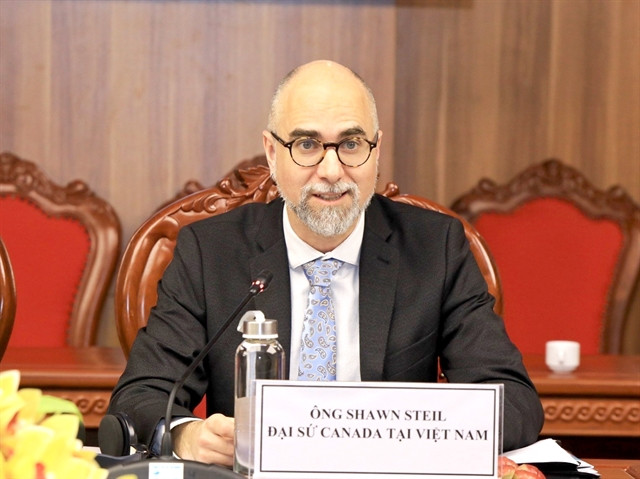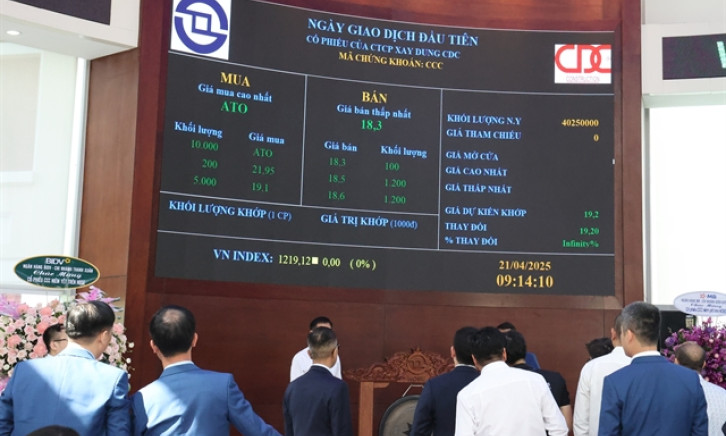Supporting Vietnamese social impact businesses a great priority of Canada: Ambassador
Shawn Steil, Canadian Ambassador to Việt Nam, speaks to Việt Nam News about Canada’s development assistance for Vietnamese social impact businesses.
Shawn Steil, Canadian Ambassador to Việt Nam, speaks to Việt Nam News about Canada’s development assistance for Vietnamese social impact businesses.
Why has Canada supported social impact businesses (SIBs) through the project “Leveraging Việt Nam’s Social Impact Business Ecosystem in Response to COVID-19” (ISEE-COVID)?
Supporting social impact businesses in Việt Nam is a great priority and a great opportunity for Canada. We support this programme because it really enables and empowers farmers, ordinary people, women and ethnic minorities to find business opportunities - a great work that we are doing for our communities.
SIBs have triple bottom line: profit, planet and people. We enable companies to support all three.
The companies supported are all grassroots organisations that people in our communities are seeing their needs and opportunities. Sometimes what they lack is business sense or finance to start their businesses. Providing a little bit of Special Equipment Amount funding, capacity building to understand business environment helps these great grassroots organisations get off the ground to support their development in Việt Nam and sell products around the world.
This year Việt Nam and Canada have celebrated 50 years of establishing diplomatic ties. We have seen lots of Canada’s development support for Vietnamese private business sector including SIBs to address social challenges. Could you elaborate on that support?
We are very proud that we not only have 50 years of diplomatic relations with Việt Nam but over 30 years of development assistance through cooperation.
Our assistance and cooperation with Việt Nam in development has transitioned with Việt Nam’s development and moved with priorities of the country.
We are proud being part of Việt Nam’s development journey from a relative poverty to now a middle-income country.
As a middle-income country, the needs for further development in Việt Nam has changed so our development assistance has changed as well to focus on mobilising, capitalising, private sector, small and medium-sized enterprises to contribute to that development, to ensure that benefits reach the most vulnerable groups.
Việt Nam is one of the fastest growing economies in the world, 8 per cent GDP growth last year, leading the world. But with that rapid growth comes challenges: Environmental challenges, increasing industrialisation, but also inequality challenges.
Canada’s development assistance really helps in shortening gaps in Việt Nam to ensure that the poorest and most vulnerable women, ethnic minorities can participate fully in that rapidly economic growth.
And we can also support medication of environmental consequences.
The partnership that we have with UNDP and Ministry of Planning and Investment (ISEE-COVID) is a perfect example.
Support for environment and growth of SIBs in Việt Nam is our way of supporting growth that works for everyone, extending opportunities for economic development and business opportunities in remote areas and in communities, but also in producing value-added goods and services that benefit society themselves or have an environmental impact.
How do you assess 30 SIBs that have received grants under “Leveraging Việt Nam’s Social Impact Business Ecosystem in Response to COVID-19” (ISEE-COVID) project this year and what do you expect their contributions to society will be?
SIBs’ dedicated efforts play a vital role in addressing social and environmental gaps, making a positive difference in Việt Nam.
The SIB sector has demonstrated remarkable resilience, generating employment opportunities for vulnerable and marginalised communities, fostering the development of eco-friendly products, adding value to authentic goods, and enhancing resilience against climate change, among numerous other endeavours that have gained global recognition.
Each of these efforts serves as an inspiration! We trust that SIBs would become successful agents of change, not just for themselves but for their communities and country.






